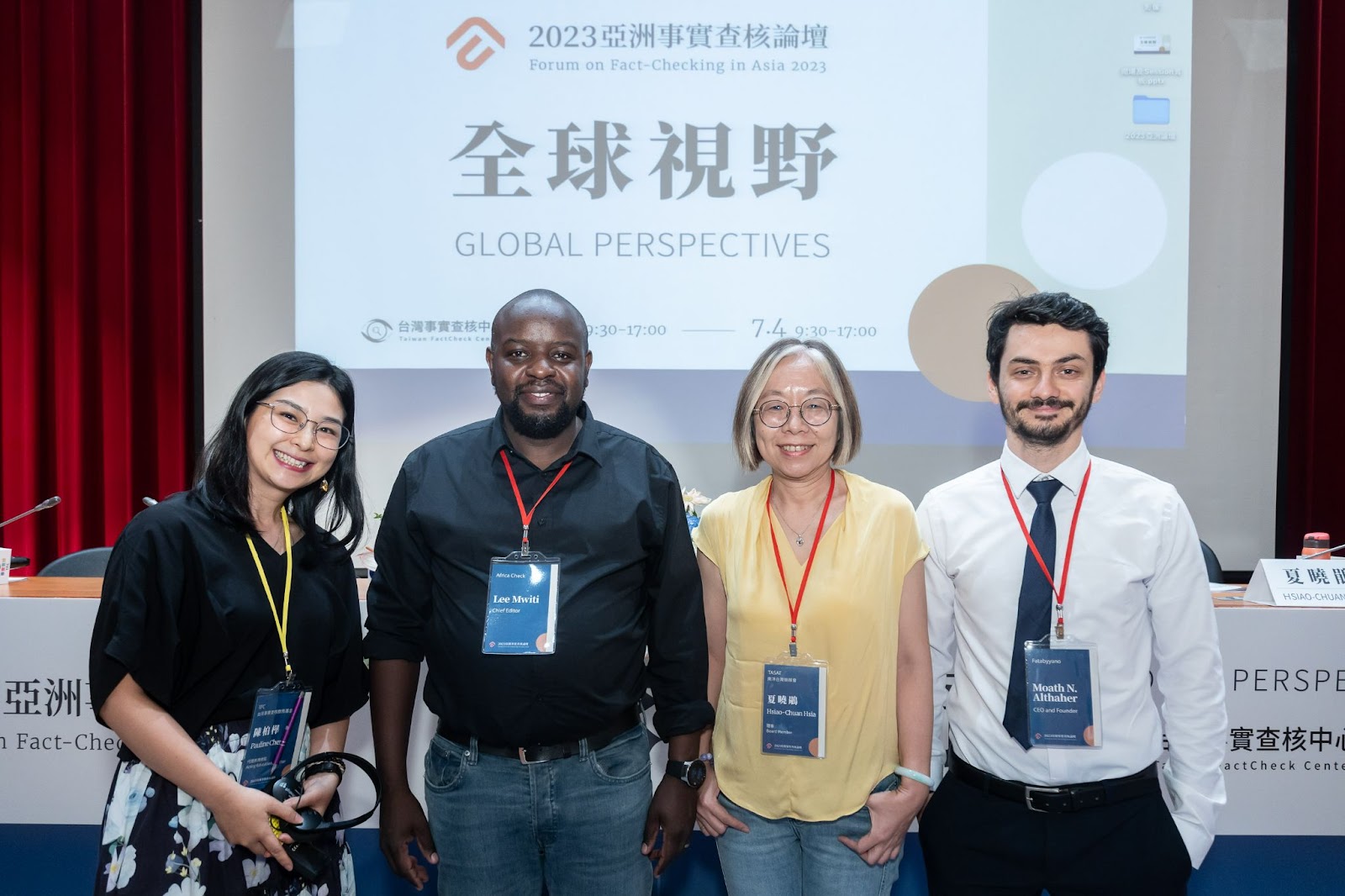Sowing the Seeds of Fact-checking by Promoting Media Literacy
Media literacy education is necessary but not easy, especially for regions covering various countries and with different languages in use. The rural-urban disparity in access to the internet and information and the age gap can also be barriers for fact-checking groups that strive to improve people’s immunity against disinformation.
The Forum on Fact-Checking in Asia 2023 discussed these difficulties in promoting media literacy on July 4, inviting experts from South Africa, Jordan, and Taiwan to share their experiences.
Image: (From left) Education director Pauline Chen, Editor-in-chief of Africa Check Lee Mwiti, board member of the TransAsia Sister Association, Taiwan (TASAT) Hsia Hsiao-chuan, and CEO & founder of Fatabyyano Moath Althaher. (Photo/ Yuan-Bin Zhao)
Localizing Media Literacy Education
Lee Mwiti is the editor-in-chief of Africa Check, a non-profit organization aiming to promote accuracy in African public debate and media. He told the audience that language is the most significant barrier to enhance media literacy in Africa as the continent has a great number of countries, and each has its own context and language.
In Nigeria, for example, more than a hundred languages are used, while many don’t understand English or can’t be easily reached.
Image: Editor-in-chief of Africa Check Lee Mwiti. (Photo/ Yuan-Bin Zhao)
The African expert also pointed out that there is a great digital gap between rural and urban areas. In Ghana and Kenya, for instance, about two-thirds of the young people are able to get information from the Internet, whereas the ratio is low in Burkina Faso.
To promote media literacy, Africa Check has set up a WhatsApp project, “What’s Crap on WhatsApp,” for the public to report fake news, which would then be used as examples in weekly online rumor-debunking lessons. Africa Check also held workshops at school and worked with the government to promote disease prevention and election-related media literacy projects such as “Know the Facts, Get the Vax” and “Matter of Fact” to pass on fact-checking techniques to the young generation.
Image: Screenshot of the webpage of the Africa Check’s WhatsApp project What’s Crap on WhatsApp.
Africa Check would also localize their promotional events in accordance with each African country’s context, Mwiti said. A project calling on people to play “Facts Ambassadors” garnered great popularity in Nigeria, for example, because Nigerian people are fond of the title “Ambassador” and are happy to play the role of communicating facts on social media platforms.
As radio is a widely used media, Africa Check has also worked with radio stations, together with community heads and religious leaders, to promote media literacy, Mwiti added.
Health Information Literacy in Urgent Need
There are more than two hundred million social media users in the Middle East and North Africa, and information is being produced at a pace faster than people can digest it, said Moath Althaher, the CEO & founder of Fatabyyano – a fact-checking platform in the MENA region followed by more than 1,000,000 Arabic-speaking followers in 19 countries.
About one-third of the information about cancers and nutrition online is false, and messages containing false information had spread even more widely during the pandemic, making fact-checking all the more critical, Althaher said.
Fatabyyano focuses on health information literacy and, in the past few years, has been dedicated to helping and informing the public about how to decode spurious medical information with more than 50 workshops hosted so far.
Image: Moath Althaher, the CEO & founder of Jordanian fact-checking organization Fatabyyano. (Photo/ Yuan-Bin Zhao)
Migrant Workers in Taiwan
In Taiwan, migrant workers and foreign spouses from Southeast Asia have also been victims of scams and fake government messages due to language barriers.
Hsia Hsiao-chuan, a board member of the TransAsia Sister Association, Taiwan (TASAT), said they found that many migrant workers and foreign spouses, having no access to local information, could easily fall prey to phishing messages and fake texts appearing to be from the Taiwanese government or online shopping sites.
Starting this year, the group has been working with the TFC and MAFINDO, a fact-checking group based in Indonesia, to help migrant workers and foreign spouses identify fraud.
Image: Board member of the TransAsia Sister Association, Taiwan (TASAT) Hsia Hsiao-chuan. (Photo/ Yuan-Bin Zhao)
Most of the migrant workers in Taiwan are from Indonesia, and a majority of the scam cases have occurred among Indonesians, as the migrant workers are less vigilant about messages in Bahasa Indonesia when they’re abroad, but the sympathy for their compatriots and the information gap could be easily targeted by swindlers, Hsia said.
TASAT would go to where migrant workers often gather and play interactive games with them – asking them to identify different types of disinformation – and teach them how to use fact-checking tools. The group staff would also give them a piece of fake news using their names, produced by ChatGPT, as a gift to raise their awareness about online frauds and fake news.
Image: TASAT released a procast program in Bahasa Indonesia, raising awareness of misinformation and hoaxes problem.
You can read the Chinese version of this article here.






